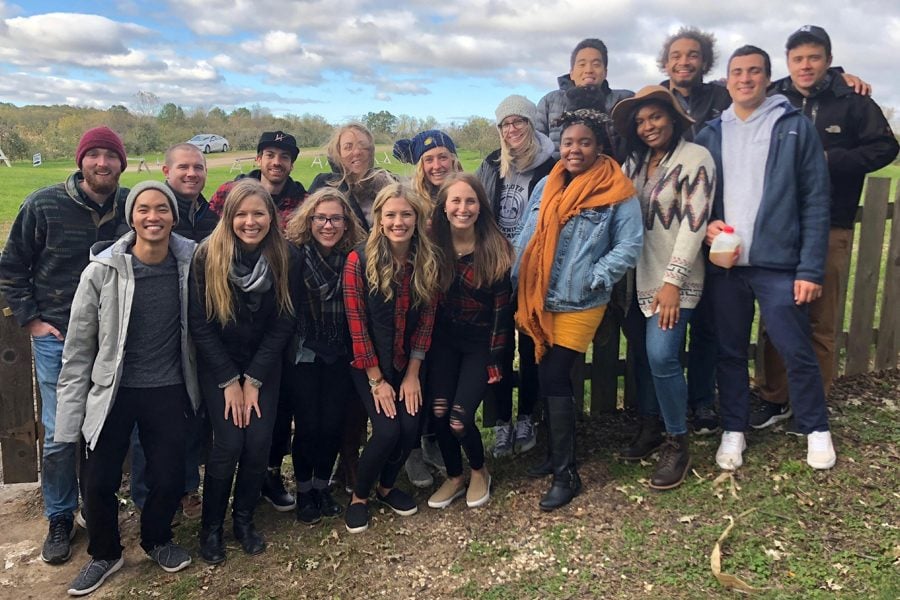In God we trust?: Young Life leaders bring Christianity to North Shore teens — though it’s not for everyone
Northwestern Young Life leaders on a retreat. The students lead Bible studies as well as meet up with high school students to hang out and form relationships.
January 24, 2019
This article is the first in a series on religious involvement on Northwestern’s campus. In the midst of studies showing declining levels of religiosity among college students, the series will spotlight different religious groups’ methods and thoughts on maintaining their faith.
Religion played a large part in Weinberg sophomore Kayden Washington’s upbringing: He was raised in a nondenominational Christian family and went to church nearly every Sunday. In search of a religious community in college, Washington ended up in a club he had been involved with as a high schooler — Young Life.
Young Life’s mission is “introducing adolescents to Jesus Christ and helping them grow in their faith,” according to their website. Originating in a Texan Bible study chapter in 1939, the organization now maintains a global operation dedicated to engaging with middle-schoolers and high-schoolers through prayer and community. NU students can become group leaders at local high schools through Young Life’s North Shore chapter.
Studies about declining religiosity among college students are not hard to find. The number of college freshmen who have no religious affiliation has tripled from 1986 to 2016, according to a story from Scientific American. Yet Washington and his fellow leaders often participate in Young Life events multiple times a week.
While leading Bible studies and introducing kids to religious text is important, Washington said the relationship-building aspect of Young Life’s work makes it more effective and personally meaningful.
“Young Life really, really, really stresses the idea of community and forming a relationship and then sharing the gospel through that relationship as opposed to a more up-front (approach),” Washington said.
Washington said he understands why some students don’t choose to pursue religion. He did not find it difficult to keep up his faith because he felt in touch with his spiritual goals, he said, but he imagines most college students enter with uncertainty over their faith –– leading to an overall decline in spirituality.
The existence of a stigma around religion is also present on campus, he said.
“People have stereotypes and ideas of like, ‘Oh, this is what (religious people) do, this is what they don’t do,’” Washington said. “It’s just one of the groups that people are labeled into.”
Jamaica Ponder, a Medill sophomore, participated in Young Life while in high school. Like Washington, she grew up going to church, though she said her family valued the community experience more than the actual religious content. Having participated in high school, she was immediately drawn to being a Young Life youth leader once she arrived at NU.
Ponder began going to weekly meetings, but ultimately withdrew from participating when she was asked to sign a contract that contained stipulations she “took personal problem with,” she said.
The contract asked students to follow rules including not engaging in premarital sex, drinking alcohol or doing drugs, Ponder said. She also said she found the group’s stance on homosexuality to be “murky,” and decided that she did not want to sign a contract that she knew she could not follow.
Since then, she has not been involved in religious activity on campus, not finding any of the offerings to be in line with the religious environment she was looking for.
“I haven’t really found any other outlet at Northwestern that I felt like I could genuinely be a part of and get some religious fulfillment from,” she said.
For Amber Luczak, though, Young Life participation has been critical to maintaining her faith and a cornerstone of her college experience. Through her youth leadership, the Weinberg senior said she discovered a passion for education and cemented her religiosity.
“Young Life has been helpful for me in terms of discovering what I want to do in the future. It had a lot to do with me wanting to go into education, so that’s been great. And then, it’s been fulfilling,” she said. “That’s a good thing to have in college.”
Email: [email protected]
Twitter: @birenbomb


